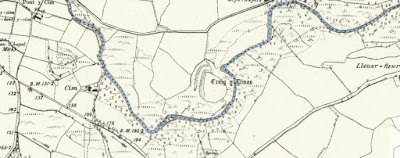Craig-Y-Dinas hillfort entrance
Gwyr kaer tathal oedynt kenedyl y arthur o bleit y dat.
"Men of Caer Dathal were they, kindred to Arthur on his father's side."
CULHWCH AND OLWEN
The entry on Iaen from P.C. Bartram's A CLASSICAL WELSH DICTIONARY:
A list of the sons of Iaen, supposed to be present at Arthur's Court, is given in the tale of ‘Culhwch and Olwen’ (WM 461, RM 107). Their names are: Teregud, Sulien, Bradwen, Morien, Siawn, and Caradog, and they are said to be men of Caer Dathal... In the ‘Hanesyn Hen’ tract there is a list of the children of Iaen as follows (ByA §2 in EWGT p.85): Dirmig Corneu, Gwyn Goluthon, Siawn, Caradog, Ievannwy, Llychlyn, and a daughter, Eleirch, mother of Cydfan ab Arthur. Note that only two names, Siawn and Caradog, are common to the two lists.
From the GPC on the meaning of the Welsh word iaen:
sheet or cake of ice (sometimes with ref. to one particular characteristic, e.g. its greenish-blue tint, clearness or transparency, coldness, hardness, brittleness); glacier.
The root is:
iâ
[H. Grn. iey, gl. glacies, H. Wydd. aig (gen. eg), o’r gwr. *ieg- ‘iâ, rhew’, cf. H. Nor. jaki ‘darn o iâ’, Hetheg ega- ‘iâ’]
eg. ll. (prin) iaau, iaon.
Dŵr wedi rhewi’n galed, rhew; ?barrug, llwydrew:
ice; ?frost, hoar-frost.
One of the Irish words, utilizing the same Celtic root, is aigre. In a moment I will discuss the possible significance of this word. But for now, here are the relevant Irish words from the eDIL:
1 aig
Cite this: eDIL s.v. 1 aig or dil.ie/909
Forms: a.
n i ice : a.¤ gl. cristallus, Sg. 67b19 . mathair etha a.¤ / mathair saille snechta, LL 345a9 . luachair ega (of a hero), Sc.M² 15 . cride n-ega, ib. lán a utlaig do bissib ega, Trip.² 126 . bit lir bomand ega icicles , BDD² 861 . bomand ega fó chosaib, TTr.² 1162 . blogo egæ, ACL iii 310.9 . reodh ┐ aigh anacnata . . . go nimtiaghdais cach locha . . . ar na lecaibh eagha, AFM iv 900.y .
aigre
Cite this: eDIL s.v. aigre or dil.ie/943
Forms: eigre
n f. also eigre = aigred: aigri nā legat fria loscad ` iceblocks ( ice ?) which melt not for heat (of hell)', ZCP xii 296.30 . do bisib eaga .i. do cuisni heigri, Trip. xlvii 26 . do bhrígh na hoidhre, Job vi 16 . teilgidh sé amach a leac oidhre, Psalms xvi 17 .
aigred
Cite this: eDIL s.v. aigred or dil.ie/944
Forms: oighredh, eighredh
n [o, n.] collect. of 1 aig. Later m. oighredh, eighredh m., IGT Decl. § 11 . ice : fíal tened ┐ fíal d'aigriud, LU 2066 ( FA 14 ). ticc in t-aighredh mur ghlain nguirmm, Anecd. i 27 § 19 . do aigred for cumaicc in cristal do denum, BB 493b1 . ní biadh eighredh in gach dú, Ériu iii 148 § 4 . mar tic oigred re tāeb tuili, ACL iii 242 § 15 . sicc mor, co téighdis groigthi . . . ar in eighridh, RC xviii 30.15 . in tobair ingnáith dianad aiste óigread in cech lo, Alex. 349 (= dia ndenand oigredh isin ló, BB 488a28 ). nach briseann oigreadh éntráith, Ériu iv 218 § 24 . guirmither oigread a rosc, MR 64.23 . tré oighreadh núa ní chuir crú (a horse), IGT Decl. ex. 862 . Attrib. g s. cuisne eighridh, IGT Decl. ex. 368 . lec aigrid, see lecc. síon oighridh `icy weather', Studies 1921, 418 § 9 . ind aidhce adhuair eighridh, Anecd. ii 23 § 4 . i madain oighrid innfuair, SG 172.13.
When I look at aigre/eigre, I can't but help think of Welsh Eigr, the spelling used by the Welsh for Arthur's mother. What I think we may have in W. Iaen is an intentional substitution for Eigr, itself misinterpreted as is it were Irish aigre. Eigr itself, according to Dr. Graham Isaac, "is a perfectly regular reflex of *akri (with a Long i), feminine derivative of the familiar *akro- ‘sharp, pointed; point, promontory'. Craig-Y-Dinas/Caer Dathal occupies "a promontory above the Afon Llyfni" (https://coflein.gov.uk/en/site/93534/details/craig-y-dinas-camp).
The Irish are to be associated with Caer Dathal (see https://mistshadows.blogspot.com/2019/01/caer-dathal-and-its-ancient-ruler.html).
I will next take a look at what it would mean for Arthur to have been born at Craig-Y-Dinas in Gwynedd. And what this might tell us about his father, Uther Pendragon.


No comments:
Post a Comment
Note: Only a member of this blog may post a comment.